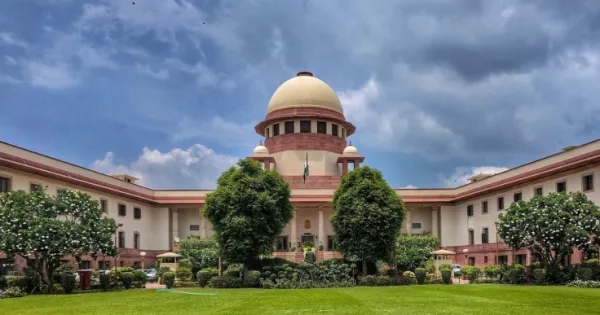Constitution helped transform India into a mature and vibrant democracy:- CJI Sanjiv Khanna.
Independent morning.
Chief Justice of India Sanjiv Khanna said that it was the Constitution that helped transform India into the mature and vibrant democracy that it is today, a self-confident nation and geopolitical leader. He said, “Since Independence, India has undertaken a transformational journey. A nation that suffered from post-partition poverty, widespread illiteracy, poverty and hunger, lack of a strong system of democratic checks and balances, which resulted in self-doubt – Today India has emerged as a mature and vibrant democracy, a geopolitical leader, which has helped in its transformation.”
Speaking at the Constitution Day function organized by the Supreme Court Bar Association, Chief Justice Khanna said that the Constitution is a way of life, which must be followed. CJI Khanna emphasized the role of the Bar in making the judiciary a strong institution. He said, “We often refer to the judiciary as an individual, i.e. the judge. But the judiciary also equally represents the bar. I cannot imagine a judiciary in which members of the bar are not an integral part of it You are as much a part of the judiciary as the judge.
CJI Khanna said lawyers are the first persons to whom citizens come with their legal complaints and they act as their spokespersons before the courts. Advocates help judges decide cases according to legal principles. The Chief Justice said that judges shine like lawyers. The better the bar, the better the judges. The Chief Justice said that the historic judgments given by the Supreme Court would not have been possible without the help of lawyers.
The Chief Justice said, “The Supreme Court of India has a strong legacy. We have taken a variety of judgments ranging from environmental law, privacy law, fundamental rights, basic structure doctrine. Many of these judgments are due to the contributions and efforts of the members of the Bar. Would not have been possible without “Attorney General of India R. Venkataramani, SCBA President Kapil Sibal etc. also addressed the event.
Supreme Court Justice Rajesh Bindal recently called for a balanced discussion on the rights and duties of citizens. Speaking on the increasing focus on rights as compared to duties, Justice Bindal remarked, “Everyone is forgetting the fundamental duties. You go to court, it is my right. No one talks about duty. Furthermore, he highlighted the important role of media in spreading information, citing cases where media reports have prompted judicial intervention. Did.
Senior advocate Dr Abhishek Manu Singhvi recently commented on judicial independence in politically sensitive cases, calling it a “mixed matter”. Singhvi emphasized that the outcome in such cases often depends on the composition of the bench. “So you get a decision by lottery, with decisions varying 10 ways out of 17 benches,” he said.
Singhvi highlighted the tendency of the judiciary to avoid conclusive decisions in some cases, commenting, “There is a tendency to make decisions for the sake of not making decisions, and the other way around: the operation is successful, but the patient dies. This has happened in some recent cases.”
Furthermore, Singhvi reflected on judicial review in India, describing it as “unlimited” and primarily beneficial. While at times acknowledging its irregular and uncontrolled aspects, he argued that these were the exception rather than the rule.
He said, “Now it is in all the courts of the country. The limits of judicial review in India are limitless and I think that is a good thing, rather than the greater harm done by somewhat irregular and uncontrolled judicial review Deviations do not define the rules. We must ensure that the unruly horse is steered well.”
He also traces the evolution of the Supreme Court, from the protection of individual rights in the 1950s and 60s to the era of economic and social rights, the emergency period marked by the ADM Jabalpur judgment and the liberal leanings during the tenure of former Chief Justice DY Chandrachud. Different phases were identified till then. He said, “The previous Chief Justice (CJI DY Chandrachud) had a more liberal court, where he tried to speak truth to power, tried “, but were not always successful.”
On the role of the media, he criticized the “degeneration of discussion” in electronic media, which he suggested aids judicial independence by preventing undue influence. He praised the print media, saying that it is relatively more responsible. He said, “The decline in the level of discourse in the media has actually helped the judges maintain their independence and anyone looking at it in the right mind has Can't be impressed… What a load of garbage. The print media is a little more responsible.”


Comments are closed.